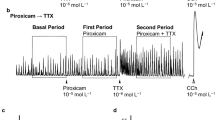Abstract
Prostaglandin E1 (PGE1) and cholera enterotoxin stimulate small-intestine mucosal adenylate cyclase and intestinal secretion of water and electrolytes. The previous suggestion that PGE may mediate cholera-toxin effects was explored in these studies. Closed rabbit jejunal loops were injectedin vivo with cholera toxin and compared to similar loops in the same animal injected with buffer. Loop mucosal homogenates and intestinal secretions were analyzed by radioimmunoassay for cAMP and PGE concentrations. Cholera toxin produced significant increases in mucosal and intestinal fluid cAMP; however, there were no significant increases in PGE in the toxin-treated loops when compared to the control loops. In addition, there was no correlation between cAMP and PGE in the same samples. These studies indicate that cholera toxin stimulates intestinal cAMP and secretion independent of PGE synthesis and provide evidence against a specific role for PGE in mediating cholera-toxin effects.
Similar content being viewed by others
References
Dutta NK, Habbu MK: Experimental cholera in infant rabbits: A method for chemotherapeutic investigation. Br J Pharmacol 10:153–159, 1955
De SN, Chatterje DN: An experimental study of the mechanism of action of vibrio cholerae on the intestinal mucous membrane. J Pathol Bacteriol 66:559–562, 1953
Sack RB, Carpenter CCJ, Steenburg RW, Pierce NF: Experimental cholera: A canine model. Lancet 2:206–207, 1966
Benyajati C: Experimental cholera in humans. Br Med J 1:140–142, 1966
Schafer DE, Lust WD, Sircar B, Goldberg ND: Elevated concentration of adenosine 3′:5′-cyclic monophosphate in intestinal mucosa after treatment with cholera toxin. Proc Natl Acad Sci U.S.A. 67:851–856, 1970
Kimberg DV, Field M, Johnson J, Henderson A, Gershon E: Stimulation of intestinal mucosal adenyl cyclase by cholera enterotoxin and prostaglandins. J Clin Invest 50:1218–1230, 1971
Sharp GWG, Hynie S: Stimulation of intestinal adenyl cyclase by cholera toxin. Nature (London) 229:266–269, 1971
Field M, Fromm D, Wallace CK, Greenough III WB: Stimulation of active chloride secretion in small intestine by cholera exotoxin. J Clin Invest 48:24a, 1969
Pierce NF, Carpenter CCJ, Elliott HL, Greenough III WB: Effects of prostaglandins, theophylline and cholera exotoxin upon transmucosal water and electrolyte movement in the canine jejunum. Gastroenterology 60:22–32, 1971
Sandler M, Karim SMM, Williams ED: Prostaglandins in amine-peptide-secreting tumours. Lancet 11:1053–1055, 1968
Williams ED, Karim SMM, Sandler M: Prostaglandin secretion by medullary carcinoma of the thyroid. Lancet 1:22–23, 1968
Kimberg DV, Field M, Gershon E, Henderson A: Effects of prostaglandins and cholera enterotoxin on intestinal mucosal cyclic AMP accumulation. Evidence against an essential role for prostaglandins in the action of toxin. J Clin Invest 53:941–949, 1974
Jacoby HI, Marshall CH: Antagonism of cholera enterotoxin by anti-inflammatory agents in the rat. Nature (London) 235:163–165, 1972
Finch A, Katz R: Prevention of cholera-induced intestinal secretion in the cat by aspirin. Nature (London) 238:273–274, 1972
Gots RE, Formal SB, Giannella RA: Indomethacin inhibition of salmonella typhimurium, shigella flexneri, and cholera-mediated rabbit ileal secretion. J Infect Dis 130:280–284, 1974
Ferreira SH, Moncada S, Vane JR: Indomethacin and aspirin abolished prostaglandin release from the spleen. Nature (London), New Biol 231:237–239, 1971
Vane JR: Inhibition of prostaglandin synthesis as a mechanism of action for aspirin-like drugs. Nature (London), New Biol 231:232–235, 1971
Smith AP: Response of aspirin-allergic patients to challenge by some analgesics in common use. Br Med J 2:494–496, 1971
Smith ID, Temple DM: The influence of analgesic drugs on the actions of prostaglandin F2α on the human uterusin vivo and human and rabbit myometrial stripsin vitro. Prostaglandins 4:469–477, 1973
Hinsdale JG, Engel JJ, Wilson DE: Prostaglandin E in peptic ulcer disease. Prostaglandins 6:495–500, 1974
Lowry OH, Rosebrough NJ, Farr AL, Randall RJ: Protein measurement with the folin phenol reagent. J Biol Chem 193:265–275, 1951
Bourne HR: Cholera enterotoxin: Failure of anti-inflammatory agents to prevent cyclic AMP accumulation. Nature (London) 241:399, 1973
Author information
Authors and Affiliations
Rights and permissions
About this article
Cite this article
Hudson, N., Hindi, S.E., Wilson, D.E. et al. Prostaglandin E in cholera toxin-induced intestinal secretion. Digest Dis Sci 20, 1035–1039 (1975). https://doi.org/10.1007/BF01071191
Issue Date:
DOI: https://doi.org/10.1007/BF01071191




